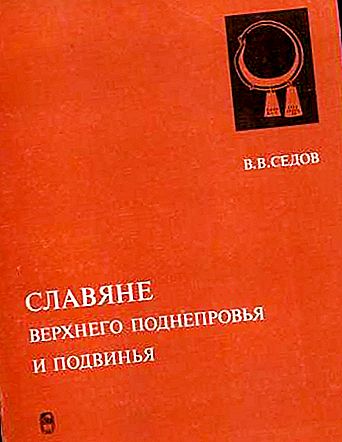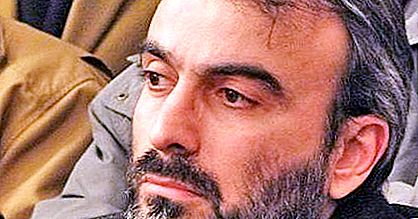In 2004, on the night of October fifth, in the eightieth year, the famous academician, outstanding Soviet and Russian scholar-Slavist Valentin Vasilyevich Sedov passed away. He created the modern theory of the historical ethnic group of the Slavs. Valentin Vasilievich is an undeniable leader, an academician with worldwide recognition. His amazing industriousness and rare erudition, bright pedagogical and unique organizational skills allowed the scientist to play an exceptional role in archaeological research of vast territories for a long time. He has done significant work in Old Russian Slavic studies, in the life of the archaeological department of the Russian Academy of Sciences, and in Russian archaeological science.
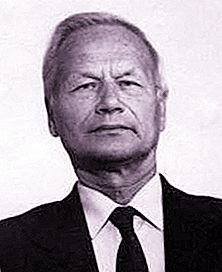
Brief Biographical Information
Born in a family of workers in Noginsk. After leaving school (1941), he entered the Aviation Institute, but the war began, and he was enrolled in the military infantry school. In November 1942 he went to the front. Valentin Sedov visited many fronts. His fearlessness and courage are marked by awards from the government. The main one is the Order of the Red Star. Also awarded the medal "For Military Merit."
First steps in science
He became interested in history after the end of the war, and the beginning of the scientific activity of the future academician fell on the post-war years.
In 1951, Valentin Vasilievich graduated from Moscow University, Department of Archeology at the Faculty of History. Then there was a graduate school of the Institute of Archeology of the Russian Academy of Sciences.
By 1954, the future academician is completing a large work, which translates into a dissertation for the degree of candidate of sciences, “Krivichi and Slavs”. And already in 1967, Sedov Valentin received a doctorate in historical sciences for his dissertation research “Slavs of the Upper Dnieper and the Dnieper”. Three years later, this work was published as a monograph.
Phenomenal popularity
In the 60s of the last century, at the time of the formation of Sedov as a scientific researcher, his recognition by students was off scale. Even then they composed legends about him. For future archaeologists, Valentin Valentinovich was like a magnet. He attracted young minds with his openness, enthusiasm, new promising areas of world-wide science, a unique ability to generalize and build logical chains, and simply a fanatical enthusiasm for theoretical and practical archeology.
Foreign recognition
Usually the authority of a scientist takes quite a long time and is recognized gradually. Valentin Sedov managed to conquer the foreign academic Olympus back in 1970, being the head of the delegation of Russian Slavic archaeologists. His speech at the Berlin Second International Congress of Archeology of the Slavic Ethnicity was a great success. At this time, the next monograph of the academician - "Novgorod hills." Both books aroused great resonance among archaeologists of Russia and many foreign countries.
Scientific heritage
The versatility of publishing is known Sedov Valentin Vasilievich. Books and magazines in which he acted as the editor-in-chief cannot be counted. Since 1989, the academician was a member of the editorial boards of various magazines and publications.
It is considered indisputable that Valentin Vasilyevich did not have student work. Even the early publications of the young scientist were convincing with their consistency. His work of the formation period, written in 1953, “Ethnic Composition of the Population of the North-Western Lands of Veliky Novgorod” is especially notable. Already here, the ability to process complex material, the versatility of views regarding paganism, and the ability to create anthropometric sketches were noticed.
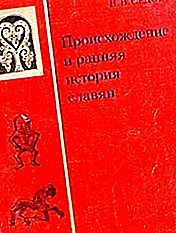
In his first book, “Rural Settlements of the Central Regions of Smolensk Land (VIII-XV Centuries), ” Valentin Sedov sets an entirely new vector in the archaeological Slavic of the Russian state. It cannot be said that before him no efforts were made to characterize Russian villages from an archaeological point of view during the pagan period. But all the work came down to the processing of barrow materials. No serious studies have been conducted. Valentin Vasilievich was the first to begin a thorough study of the settlement and structure of ancient Russian settlements, and for several decades he remained the only scientist to seriously develop this issue. His archaeological campaigns, ahead of time, were continued only after 30 years.
Among the published books and monographs of the academician, the following stands out: "Eastern Slavs in the VI-XIII centuries." She saw the light in 1982 in the serial production of “Archeology of the USSR” B. A. Rybakova. The manuscript was waiting for publication for a long time, because its concept was contrary to the editor’s convictions. When the book was printed, it became clear that it is the main decoration of the series. This happened for the sole reason that the author of this book was alone. The remaining volumes were co-written and did not have a unified idea and line of narration. There was a lot of irrelevant information in them, beyond which it is difficult to isolate really important facts. As a result, in 1984, Valentin Vasilievich Sedov received the USSR State Prize for this work.
Academician who "saw the earth"
In addition to the remarkable research works on the problems of Finno-Ugric, Slavic and Baltic archeology, the scientist is also known as a terrific field archeologist. In narrow circles, its development of Novgorod, Pskov and Vladimir lands is still popular. For twenty years, since 1971, Valentin Vasilyevich Sedov conducted research in the oldest city, the monument of Ancient Russia - Izborsk. Today it is almost completely excavated. The early history of the monument formed the basis of the monograph "Izborsk - Proto-Town". She was released two years before the death of the author.
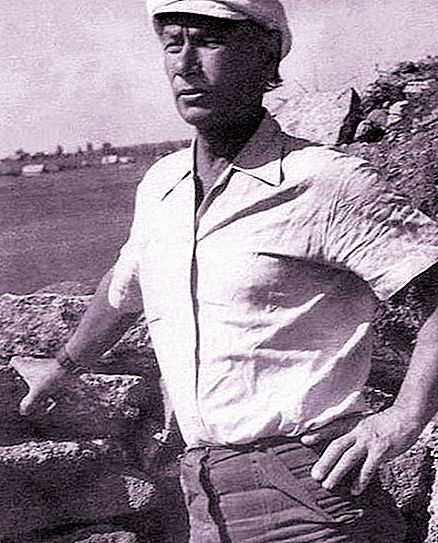
As the head of the Pskov expedition from the Institute of Archeology and the historical and architectural museum-reserve of the city of Pskov, from 1983 to 1992, Valentin Vasilievich made an invaluable contribution to the archaeological base of the original sources of Russia from the Middle Ages.

